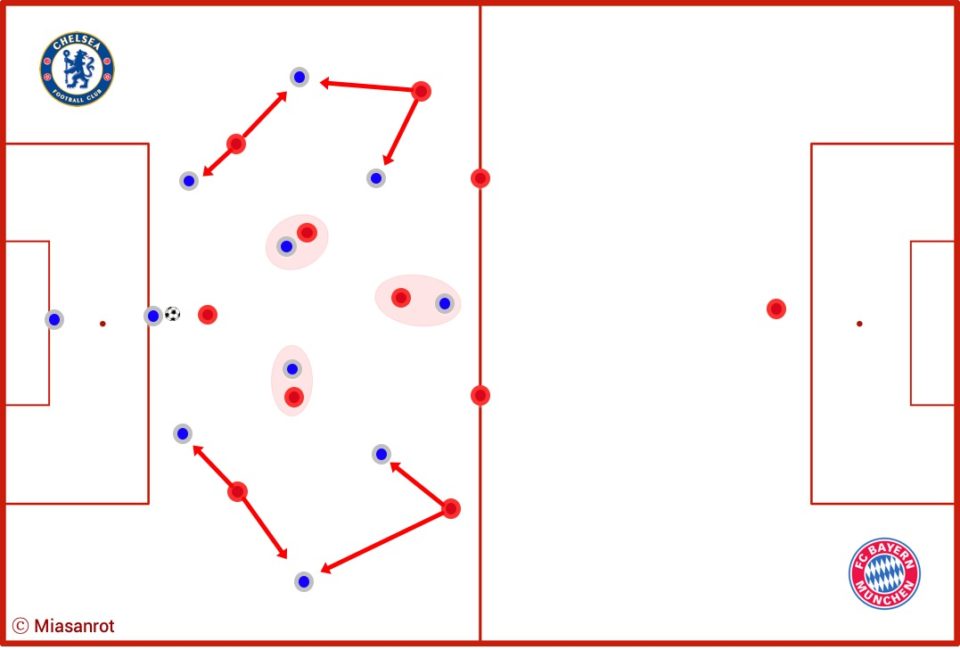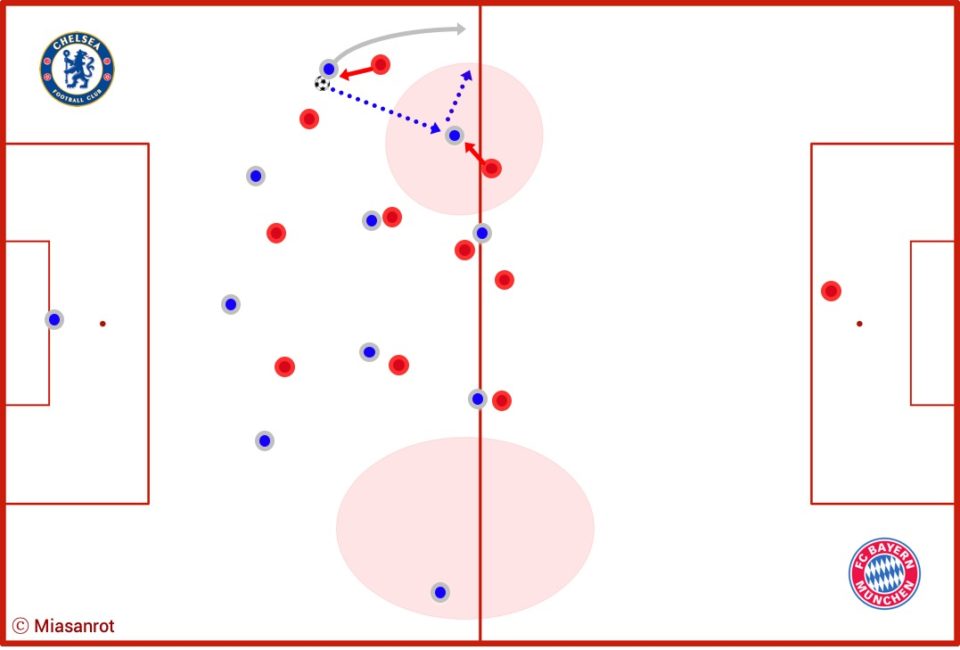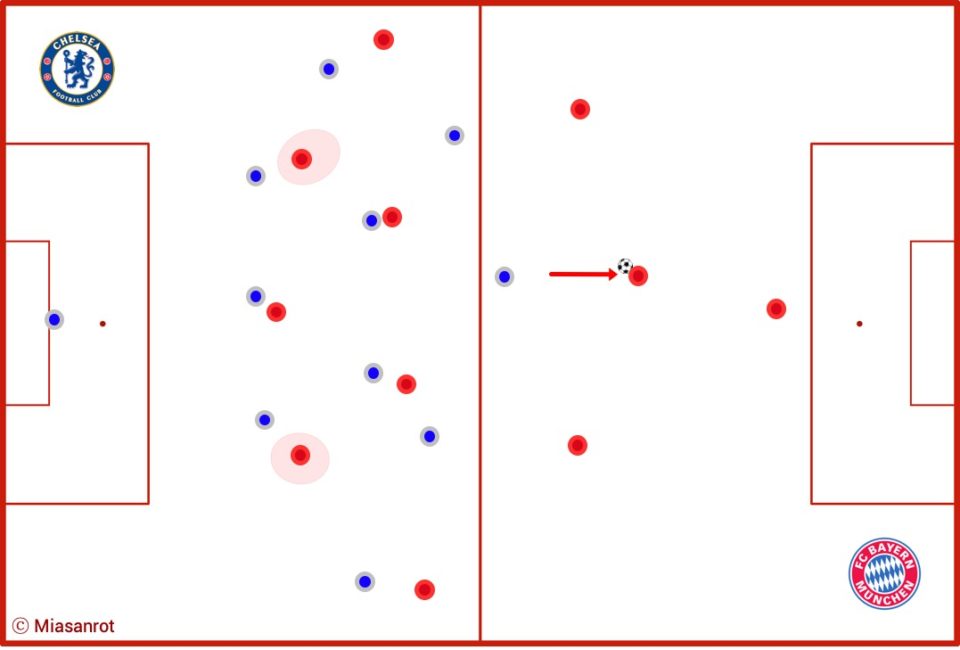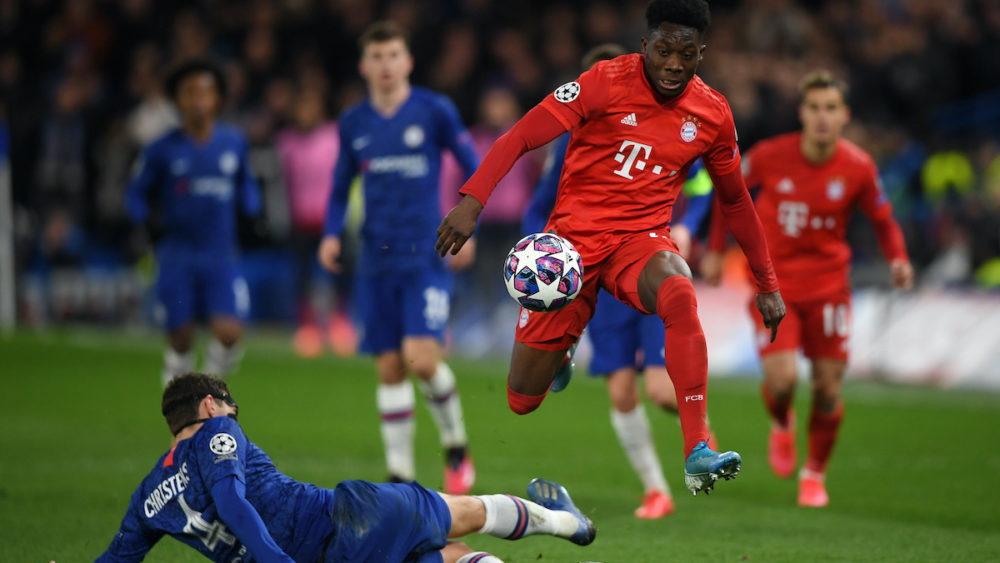Champions League R16 Second Leg Preview: Bayern against Chelsea
At the end of February, Bayern seemed to have reached a first peak under the yet new reign of Hansi Flick. Before the UEFA Champions League round of sixteen, there was much debate about how far the Bundesliga champions really had come in the preceding months. The match against Chelsea seemed to be a good benchmark for a first true assessment.
Chelsea under Frank has become a team that consists a core of seasoned and experienced older players sprinkled with some very young and promising talents in interesting positions. This has proven a mix that combines the ability to develop with a high level of expertise.
Chelsea FC: On the way back to the top?
Over especially the last few weeks it has become increasingly clear that Chelsea FC are trying to build something. The club has signed Timo Werner (24) and Hakim Ziyech (27), two additions that are representative of the path Chelsea have been taking. Ziyech is at what is supposed to be a footballer’s best age and Werner, in signing for a club where is not in the automatic first choice in attack, proves that he is committed to taking the next step in his career. In addition, Kai Havertz (21) is also heavily linked to the club. He is a player who is still at the beginning of his career but has nevertheless attracted the interest of many top clubs – including Bayern.
That these players did not opt to join a bigger club than Chelsea despite plenty of other suitors is testament to the clarity of the concept of how the club is going to return to the European elite and the conviction with which it is is able to present it to new players. At Chelsea, they know that they will play a key part in the club’s way back to the top of the Champions League.
But until the end of this way is in sight, a lot of water is yet to flow down the river Thames. At the moment, Chelsea look more like a second-rate club in the Champions League. Nothing could underline this more than the first leg of the round of 16 against FC Bayern. Bayern’s 0-3 away win was well deserved as Frank Lampard’s side at almost every stage of the game seemed to be unable to cope with the level of quality the side from Munich was able to show.
Lack of consistency
Mistakes in positional play, nervousness on the ball and a lack of precision in the final third – in almost every department Chelsea lacked the necessary quality to be able to pose a threat to Bayern. And yet this game was another step forward for the Blues. It was an important experience that the team should grow from.
Since this defeat, there has been a 2-0 win over Liverpool in the FA Cup before the coronavirus break and a 2-1 win over Manchester City after the resumption. They also defeated Manchester United 3-1, but then towards the end of the season they lost 3-5 to Liverpool in a shootout in the league and the FA Cup final against Arsenal 2-1.
Despite the constant up and down Chelsea managed to reach a crucial fourth place in the Premier League which qualifies them for the Champions League in next season. Without this, Chelsea’s intended way back to the top would have been much harder.
Promising signs, but not much more (yet)
As far as their football is concerned, Chelsea lack cleverness and adaptability above all. Lampard has built a tactical framework that they may well be able to fully implement with enough time to practice. In spite of the deserved and clear defeat against Bayern, there were first inklings of what this may look like in the future: Keep a tight shape at the back, clog up the critical spaces, and then make the transition to attack in lightning speed after a ball win.
With players like Jorginho and Kovačić, they have two players in midfield who are not only strong technically but also intelligent with good vision and decision making – as we analysed in our preview of the first leg. If Chelsea manage to properly use their link-up skills to provide connection between defense and the attacking third, they will be able to create danger against any opponent. In the first leg, there were a few situations where Bayern got bogged down in the centre and Chelsea was able to win the ball and break forward through central midfield.
But the problem with this approach is that it is often prevented too easily, especially by stronger opponents. Chelsea lack patience and versatility in their build-up game. Bayern dominated the centre of midfield by exerting high pressure on Chelsea’s defense and blocking the critical passing lanes. As a result, Chelsea rarely was able to build-up from the back and often forced to overplay midfield with long balls.
Due to the lack of relief phases, Bayern could push them back during most of the game and the distances on counterattacks became too long. In such situations the team still lacks creative ideas. In addition, Lampard has not yet shown a very good hand at making adjustments during a game. Against Bayern, his switch to a four-man backline was ineffective and in last weekend’s FA Cup final he missed out on redressing the gaps in defense which Aubameyang finally managed to exploit. Perhaps this is down simply to the experience that Lampard still lacks as coach. But on Saturday night he will have the chance to improve his reputation.
Three key potential game deciders
1. Aggressive Bayern press against an offensive Chelsea?
Bayern’s main task will be to put Chelsea unser a lot of pressure again. A key takeaway from the first leg for them would have been that this was a very effective strategy at the time. Tactically, little has changed since then. In Chelsea’s case, it’s just a question of whether Lampard will once again rely on a back five or whether he will choose a more offensive setup in view of the deficit. With the return of N’golo Kanté, a three-man midfield would be possible to theoretically counter Bayern more effectively. Jorginho will be missing on a second yellow card, which leaves Chelsea short an important player in the center.

If Lampard opts for a back five again, Bayern would be well advised to use the same approach against the ball as in the first leg. At that time they worked with man marking in the centre. Thiago, Kimmich and Müller took the two central playmakers Jorginho and Kovačić out of the game. Lewandowski acted as a kind of director for the opponent’s build-up play. He closed down the back three from an angle thus steering the first pass. The wingers Coman and Gnabry each positioned themselves in such a way that they could close down Chelsea’s back-line when they received the ball while at the same time making it difficult for them to pass to the wing-backs.
In the best case from Bayern’s point of view, Chelsea were so forced to play either long balls directly into the feet of the Bayern back line or dangerous chipped balls out onto the wings, where Bayern’s defenders were eagerly waiting to pounce.
Pavard and Davies in particular were an important piece of the puzzle in the first leg, because Chelsea’s wingers had no fixed opponents in the half-spaces. If Chelsea yet managed to appear in the half-spaces with a little space and time, the situation became dangerous. If Bayern’s centre-backs then decided to push out, they would open the way to Neuer behind them and take a high risk. So this can only be an emergency solution. Instead, these positions were defended either by clever positional play by the center-backs or by pulling back the offensive midfielders when the center-backs moved out to attack the opposing wing-backs on the wings.
A precise on-the-fly coordination is very important for this. It worked well in most cases in the first leg and Bayern also used this tactic successfully in many other games. A clear mark of quality for the work of the coaching staff. But it will be interesting to observe how Bayern’s pressing will stand the test of the top teams in the Champions League. If there were a soft spot in Bayern’s pressing, it would be in exactly this area.

2. Personnel problems
Neither Chelsea nor Bayern will be able to field their best eleven. But the side from London will be affected much harder. Lampard will not only have to do without the suspended Jorginho and Alonso, but also Ampadu, Azpilicueta, Bakayoko, Gilmour, Pedro and perhaps most crucially Pulisic due to injury. Bayern on the other hand “only” lack Pavard and Coman. But while the winger could be replaced in kind several times during the last months already (Coutinho and Perišić are available), this might be more difficult in the case of Pavard. Because his absence can change the whole structure of the game.
Kimmich is someone who at right-back tends to operate with a lot of offensive drive down the wing. He often charges down on the opponents’ wing- or full-back and leaves defending of the half-space behind him to his midfield teammates This can lead to situations as depicted in figure 2. The team has to be prepared for this as well as for a changed possession game without him in the center.
In the test match against Marseille Thiago was the answer. The Spaniard played a bit unusual for him in the inside right channel instead of the left. This was probably because Flick wanted to maintain Goretzka’s offensive drive on the left. In addition, this way Thiago only had to adjust his game a little. Although his passing angles are different from a half left positioning, where he in the past seemed to be more efficient with his passing, the solution should still be a serviceable compromise. Moreover, in this setup Thiago can also balance out Kimmich’s offensive runs by backing up for him and so maintain the harmony in the Bayern game.
in the early stages of the game against Marseille, Thiago often did this by shifting out to the right when Bayern were in possession to cover for Kimmich’s more offensive positioning. The result was a kind of defensive three together with Boateng and Alaba to secure the space behind the ball. However, Thiago was this often too far away from the center of the action, which Goretzka and Müller were unable to make up for.
Bayern’s game worked out better when Thiago dropped in between the center-backs. From that position he was able to involve himself more productively in the game and advance into midfield when the opponent sat deep and he was needed there.

Pavard playing deeper ensured that Kimmich could maintain his position in midfield as a playmaker with substantial impact on the flow of the game. An offensive-minded Kimmich on the right, however, may entail that Thiago could lose his influence as playmaker. The behavior of the two wingers encircled in red in the graphic becomes therefore even more pivotal to the course of the game. Serge Gnabry in particular is very good at dropping off unnoticed into midfield and thus keeping the opposition busy in the center.
This helps Goretzka and Müller to steal away from the opposition more often and thus provide variability to Bayern’s build-up play. Because if Bayern’s center remains ineffective, Chelsea will have no problem squeezing the central areas, directing the balls to the wings, and conquering them there. Variability is trump, and that requires a lot of movement and creativity in the engine room to somewhat lessen Bayern’s tendency to play down the wings. A dominant Kimmich is always good for the game, but if Bayern stick to their wings too much, Chelsea may find it too easy to adapt.
3. Where are both teams at?
A third factor will of course be the momentary form of the two teams. It is not easy to assess because of the special circumstances of the current times. Chelsea recently lost the FA Cup final despite a good performance. Once again, Lampard’s team lacked the quality to consistently seize control of a game. Especially the glaring gaps in defense when the ball was lost could, if continued against Bayern, mean an early end to the last vestiges of hope to yet progress to the Champions League quarter-final. If they continue to create their own downfall as they did on Sunday, they will not be enjoying their visit to the Allianz Arena very much.
Nevertheless, Chelsea are fully in rhythm due to the tight schedule of games in England until very recently. This can be an advantage because they are unlikely to need time to dust themselves off and become match-fit again. Bayern, on the other hand, played their last competitive match on July 4 in the DFB-Pokal win against Leverkusen. They may be fresher than Chelsea, but they could experience the same bumpy start to the game as they had against Union Berlin in the first game after the coronavirus interruption. If that is the case, it would be a great chance for Chelsea. If they score early, they might cause the side from Munich to second-guess the unassailability of their lead.
Although Flick was able to rev up the engine in the test against Marseille, the opponent in truth did not really provide much of a challenge and whether it has become warm enough to be able to operate at full tilt from the first minute on is questionable. But at least the break was shorter this time than last. Bayern should therefore be quite confident that they will not need much time to get back into gear. Their 0-3 advantage from the first leg is nevertheless extremely important.
Bayern so enjoy an opportunity that other teams in the competition do not have: They have more time to find their way into this short tournament. It is the beginning of a great chance. Because whoever wins this special Champions League tournament will probably be remembered as corona champions for a long time to come. A title whose value is surely debatable, but the uniqueness of the situation has its appeal, no matter which way you look at it. But Flick does not want to think about a potential triumph yet. Because he knows that before the party there is always the work. And even if Chelsea is only in the second tier of Europe’s elite teams at present, it would be negligent of Bayern to take anything for granted in this game.




 August 8, 2020
August 8, 2020 


